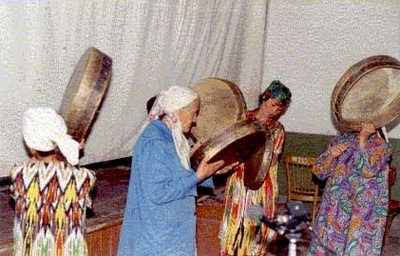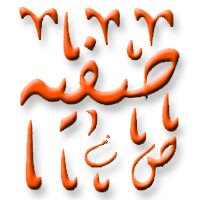(The following is a short story, not a true event - but it fictionalizes a problem so common in many of our Muslims communities, may Allah (swt) forgive us!)
It happened during the Blessed 10 days of
Zul-Hijjah. Actually, it was a few days before the
Eid ul-Adha when the news of Umm Hafsa’s murder stunned our small Muslim community. There was no question about who did it. She died at the hands of her husband. He admitted it.
Once the details of the murder became known, no one in our little masjid could believe what had occurred. The
imam himself went to the city lockup so he could hear it directly from the lips of the jailed husband. But to a group of us sisters who called ourselves close friends of Umm Hafsa, the only surprise was that we hadn’t admitted to each other that Umm Hafsa was being abused and that she needed our help before it was too late. In hindsight, all the signs were there.
On the morning of the
janaaza, we agreed to gather early in the women’s area of the masjid. We needed the comfort of each other. A tearful Umm Nadia was sitting alone saying
dua when I entered the prayer area.
“
Inna lillahi wa inna ilaihi rajioon,” she sobbed after rising to greet me. “I feel like I can’t wake up from a nightmare! I heard on the news … that he shot …” The unfinished sentence trailed off as she dug in her purse for a tissue. “And the precious children saw everything … Ya Rabb!” she wailed.
“I know, shhhh,” I murmured as she collapsed into my outstretched arms. Looking over Umm Nadia’s shoulder, I saw Sisters Halima and Amina come in. There was a chorus of
as salaamu alaikums as we all embraced each other and cried. After we sat down, we silently supplicated together for Allah to forgive the sins of Umm Hafsa and for Him to prepare her a spacious grave.
“I feel so guilty, may Allah forgive me,” Umm Nadia confessed. “I should have heeded my gut feelings. Her husband seemed so controlling and dominating. I had a bad sense about him from the start. When I saw her with that discolored eye, I believed her when she claimed that the baby had poked her. Then there was the broken arm that she explained away by saying that she tripped over her son’s toy fire truck. Ya Allah … all the excuses.”
“The miscarriage!” Sister Halima exclaimed. “Do you think …?”
Sister Amina related that she had attempted to reach Umm Hafsa by phone for weeks on end to no avail. “I knew she was home. Where else would she be?” she sniffled. “Her husband wouldn’t teach her how to drive or let her go anywhere without him. He was the one who would chauffer her when it was absolutely necessary for her to go out of the house.”
“She used to come to our
halaqas once in awhile,” I reminded them. “But he eventually put an end to that. What kind of husband doesn’t want his wife to get together with her sisters to learn about the deen?” I said as I twisted in my seat.
“He was isolating her,” Sister Halima explained. “He wouldn’t even buy a computer for the house so she could use email and instant message. You all know how much she missed her mom and her family overseas. He tried to keep her from everyone as much as he could. But he sure enough had his own Blackberry though.”
“I remember inviting her out to lunch and an afternoon of shopping,” I added. “But she told me that she didn’t have her own money.”
I hung my head and remembered the frustration I felt in trying to nurture my friendship with Umm Hafsa over the last few months. I developed a connection with her the first time I met her at the
Eid prayer a year ago. She and her husband had just moved to our community. We had children who were the same ages and she reminded me of my own sister. I drifted off remembering my gentle friend and Muslim sister. Umm Hafsa was a slim woman with warm, kind eyes. She recited
surahs with a voice so sweet that it brought tears to my eyes. My lips turned up in a smile as I remember how we used to get together a few days a week with the kids, taking them to the park, going to each other’s homes so the kids could play together, visiting, chatting, and laughing. Then her husband lost his job and he was home most of the time. I did go over to her house once when he was there. I chewed my bottom lip remembering how I could sense that he didn’t want me in his home. So I didn’t stay long that day, and it got more difficult for us to get together after that.
“What?” I said as I awoke from my daydream and realized that Umm Nadia was speaking to me.
“You were talking about money, and I was saying that he wouldn’t allow her to work. I thought it was a shame because she had a university education and really wanted to work as an English teacher. And they could have used the money.”
Sister Halima confided to us that Umm Hafsa had once acknowledged feelings of depression and anxiety. She worried about her husband’s humiliation over being unemployed. “He was always stressed out and spent most of his day barking orders at Umm Hafsa as if he was a drill sergeant. Umm Hafsa was crushed.”
“That’s no excuse,” I replied. “A lot of men lose their jobs and don’t abuse their wives. There was probably a lot going on that we didn’t know about. My point is that his abuse didn’t just happen overnight.”
“You’re right,” Sister Halima admitted. “I think the job loss intensified what was always there. Umm Hafsa was horrified that her husband spanked their son one day just because he dropped juice on the carpet. He had never laid a hand on the boy before that,” she said.
Sister Amina recounted a conversation she had with her own husband. She told him she had suspicions that her friend was being abused and she asked her husband to speak with Umm Hafsa’s husband. Sadly, Sister Amina’s husband said that he didn’t want to interfere with a brother and his family problems.
“A lot of help those brothers are,” Sister Amina complained. Umm Hafsa even resorted to consulting the
imam about the situation. She said that she knew a sister who was being abused by her husband, and the sister was seeking
naseehah. But the
imam’s only counsel to her was to say
dua and be patient with her husband. He advised her to trust Allah and assured her that He would soon grant her relief.”
Little did he know …, I mused.
“I think Umm Hafsa’s situation is similar to a problem that is common in many Muslim households,” I said. “But old attitudes and stigmas prevent families from getting help. Most of all, silence destroys Muslim families. Take us, for example. We didn’t acknowledge to each other what we all knew to be true. We resisted the temptation to feed our suspicions. We absolved ourselves by claiming that we were busy with our own homes and jobs. When we didn’t see her or hear from her we told ourselves we would check in with her “tomorrow” but the day never came.”
“What could we have done to help Umm Hafsa?” Umm Nadia asked.
“We should have tried harder to let Umm Hafsa know that she wasn’t alone. We should have found a way to let her know that we knew what was going on. We didn’t encourage her to seek the help that is out there,” I said.
Sister Amina shared with the others that there are domestic violence hotlines that are staffed with professionals and volunteers who know exactly how to help and protect women and children at risk. She told us that the help is free and confidential. Using the hotline presents a woman with choices.
Sister Halima reminded us that domestic violence does not come from the religion of Islam. After all, our dear Prophet, peace upon him, never abused any of his wives, children or grandchildren.
Umm Nadia and I acknowledged that domestic violence is a crime. Silence about domestic violence endangers our Muslim communities.
We sat and reflected on everything that had been said as the women’s section began to fill with other sisters and their children. Each of us promised ourselves that we would never again remain silent when one of our sisters was at risk. We vowed that we would help before another one of our families ended up in tragedy.
Shortly thereafter, the speakers revealed the adjusting of the microphones from upstairs in the men’s area. Umm Nadia, Sister Amina, Sister Halima and I rose and prepared to join the congregation.
The
Salat ul Janaaza for Umm Hafsa was about to start.
By S. E. Jihad Levine
© 2008






































